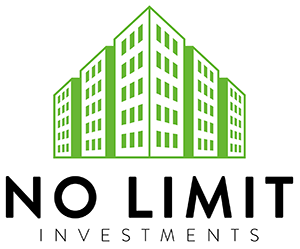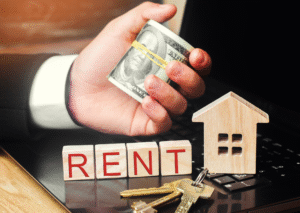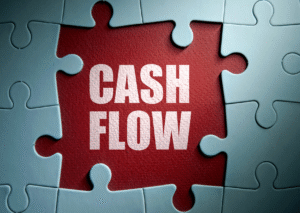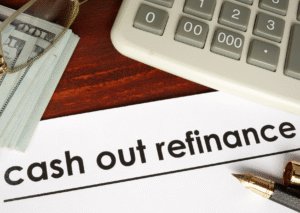What Is a Cash-Out Refinance Mortgage and How Does It Work?
A cash-out refinance mortgage is a type of loan that allows homeowners to replace their existing mortgage with a new one, while also borrowing against the equity they’ve built in their property. Unlike a traditional refinance that merely replaces the loan terms (such as rate or duration), a cash-out refinance provides extra funds that homeowners can use for other purposes.
Here’s how it works:
- You refinance your existing mortgage into a new, larger mortgage.
- The difference between the new loan amount and the old one is given to you in cash.
- That cash can then be used for personal goals, such as home improvement, debt consolidation, or investing in a new property.
According to the Consumer Financial Protection Bureau (CFPB), this strategy is most effective when used for investments that improve the value of your home or financial stability (Consumerfinance.gov).
Why Might Homeowners Consider a Cash-Out Refinance?
Homeowners might consider a cash-out refinance for several reasons:
- Home Renovations: Upgrades such as kitchen remodels, energy-efficient windows, or adding an ADU (Accessory Dwelling Unit) can increase the property’s value.
- Debt Consolidation: High-interest debts like credit cards or personal loans can be paid off using the lower-interest mortgage cash.
- Tuition or Education: A smart way to finance long-term educational investments.
- Investment in Real Estate: Use the funds as down payment for another investment property.
When used wisely, the cash from refinancing can be a catalyst for wealth building and stability.
How Does Equity Impact the Cash-Out Refinance Process?
Equity is the key player in a cash-out refinance. Your equity is the difference between what your home is worth and what you still owe on your mortgage.
To qualify:
- Lenders typically require at least 20% equity remaining in the home after the cash-out.
- Most allow borrowing up to 80% of your home’s current appraised value.
For example: If your home is worth $400,000 and you owe $250,000, you may refinance up to 80% of $400,000 ($320,000), giving you up to $70,000 in cash.
The Loan-to-Value (LTV) ratio and your creditworthiness are critical in determining the amount you can borrow.
What Are the Pros and Cons of a Cash-Out Refinance?
Pros:
- Lower Interest Rates: Compared to personal loans or credit cards.
- Potential Tax Deduction: Mortgage interest on home improvements may be deductible (IRS.gov).
- Improved Credit: Paying off high-interest debt can boost your score.
- Access to Large Sums: Allows major renovations or investments.
Cons:
- Closing Costs: Typically 2%-5% of the loan amount.
- Risk of Foreclosure: Failing to repay puts your home at risk.
- Extended Loan Term: Restarting the mortgage clock could cost more in the long run.
- Reduced Equity: Limits options for future financial needs.
Careful financial planning is crucial before proceeding.
When Is the Best Time to Use a Cash-Out Refinance?
Timing matters. Ideal situations include:
- Low Interest Rate Environment: When current mortgage rates are lower than your original rate.
- Rising Home Values: Increases your available equity.
- High-Interest Debt Load: Consolidating to a lower rate saves money.
- Upcoming Major Expense: Such as college tuition or medical costs.
Use online calculators or consult a mortgage advisor to analyze if it’s the right time based on your unique financial situation.
What Can You Use the Cash For Strategically?
Smart uses of cash-out refinance funds include:
- Home Improvements:
- Add value and comfort (new HVAC, kitchen upgrades, solar panels).
- Often increase resale value.
- Real Estate Investment:
- Buy a rental property or vacation home.
- Fund renovations for a fix & flip.
- Debt Management:
- Pay off high-interest credit card debt.
- Consolidate student loans.
- Business Ventures:
- Fund a startup or invest in expansion.
Financial experts recommend prioritizing uses that enhance long-term value or income generation.
How Do Lenders Evaluate Eligibility for a Cash-Out Refinance?
Lenders typically look at:
- Credit Score: Usually a minimum of 620, but higher is better.
- Debt-to-Income (DTI) Ratio: Most prefer DTI under 43%.
- Home Appraisal: Determines current value and eligible cash-out amount.
- Loan-to-Value Ratio (LTV): Must generally stay under 80% post-refinance.
Documentation includes:
- Proof of income
- Tax returns
- Credit reports
- Mortgage statements
Each lender may have specific requirements, so shopping around is essential.
How Does No Limit Investments Support Strategic Refinancing?
No Limit Investments offers tailored real estate financing options for investors and homeowners looking to unlock the value of their properties through strategic cash-out refinancing.
Services offered include:
- Cash-Out Refinance
- Fix & Flip Loans
- Buy & Hold Mortgages
- BRRRR Financing
- DSCR Loans
- New Construction Loans
- Credit & Debt Advisory
- Business Credit Facilities
Their streamlined process and investor-focused solutions allow you to:
- Access funds faster
- Build wealth through equity
- Grow your portfolio with smart leverage
They specialize in working with real estate investors seeking to scale while maintaining liquidity.
What Steps Should You Take Before Applying for a Cash-Out Refinance?
- Evaluate Your Financial Goals:
- Is this for improving your home, paying off debt, or building wealth?
- Check Your Credit Score:
- Higher scores get better rates and terms.
- Estimate Your Home’s Value:
- Use recent comps or get a professional appraisal.
- Review Current Mortgage Terms:
- Know your payoff amount and interest rate.
- Calculate Costs and Savings:
- Factor in closing costs, interest rates, and potential savings.
- Get Pre-Qualified:
- Work with a trusted provider like No Limit Investments.
- Gather Documents:
- Income, taxes, and home info will all be needed for underwriting.
Planning ahead can save money and ensure you use the funds wisely.
Ready to Unlock the Power of Your Home Equity?

If you’re looking to turn your home equity into a powerful tool for debt relief, home improvements, or expanding your investment portfolio, a cash-out refinance might be your next move. At No Limit Investments, we specialize in investor-friendly, fast, and flexible refinance solutions.
Whether you’re aiming to fund your next flip, build long-term rental income, or simply take control of high-interest debt, our team is here to help you structure the right loan strategy for your goals. Book an appointment today!
Don’t wait on the sidelines—leverage your equity and grow smarter today.
Final Thoughts
A cash-out refinance mortgage isn’t just a way to access quick cash—it’s a strategic financial tool when used correctly. From funding home upgrades that increase property value to consolidating high-interest debts, the benefits are tangible. But like any major financial decision, it demands planning, research, and the right lending partner.
With tailored solutions and investor-focused guidance, No Limit Investments empowers homeowners and investors to use their equity smartly and sustainably. Be informed, take action, and unlock new levels of financial freedom.
Works Cited
Consumer Financial Protection Bureau. “What Is a Cash-Out Refinance?” Consumerfinance.gov, https://www.consumerfinance.gov/ask-cfpb/what-is-a-cash-out-refinance-en-105/. Accessed 24 July 2025.
Internal Revenue Service. “Topic no. 505 Interest Expense.” IRS.gov, https://www.irs.gov/taxtopics/tc505. Accessed 24 July 2025.
Federal Reserve. “Mortgage Refinancing.” Federalreserve.gov, https://www.federalreserve.gov/pubs/refinancings/default.htm. Accessed 24 July 2025.
Fannie Mae. “Understanding the Cash-Out Refinance Process.” Fanniemae.com, https://www.fanniemae.com. Accessed 24 July 2025.
Freddie Mac. “Refinance Overview.” Freddiemac.com, https://www.freddiemac.com. Accessed 24 July 2025.
Frequently Asked Questions (FAQs)
- What is the main advantage of a cash-out refinance mortgage?
The main advantage is that it allows homeowners to tap into their home equity and receive cash to use for home improvements, debt consolidation, or real estate investments—all while potentially securing a better mortgage rate. - How much equity do I need to qualify for a cash-out refinance?
Most lenders require that you maintain at least 20% equity in your home after the refinance, meaning you can typically borrow up to 80% of your home’s appraised value. - What are some smart ways to use the funds from a cash-out refinance?
Strategic uses include upgrading your home, investing in new properties, consolidating high-interest debt, or funding a business—all of which can enhance long-term financial growth. - What factors do lenders evaluate when approving a cash-out refinance?
Lenders review your credit score (typically 620 or higher), debt-to-income (DTI) ratio, current home value via appraisal, and your loan-to-value (LTV) ratio, along with financial documentation like income and tax returns. - How can No Limit Investments help with my cash-out refinance goals?
No Limit Investments offers investor-friendly services such as cash-out refinance loans, BRRRR financing, and credit advisory to help homeowners and real estate investors unlock equity and scale their portfolios strategically.







